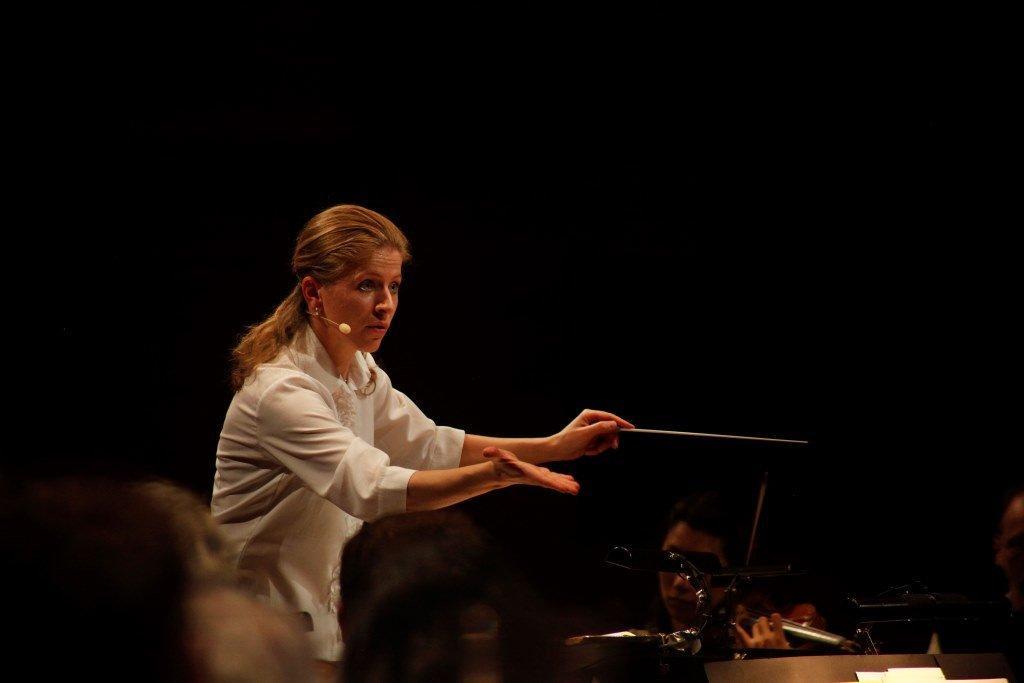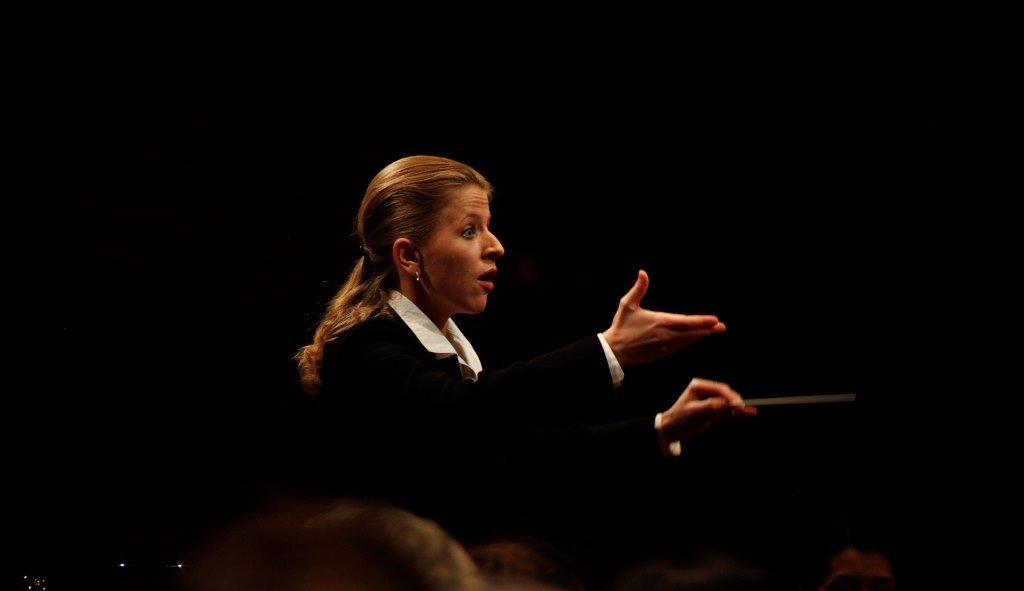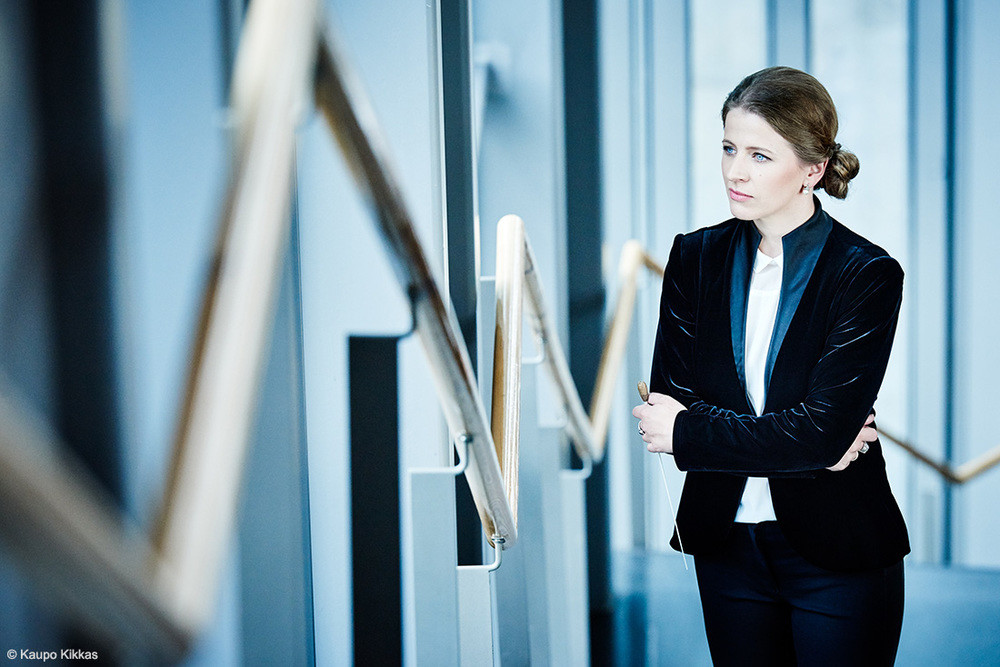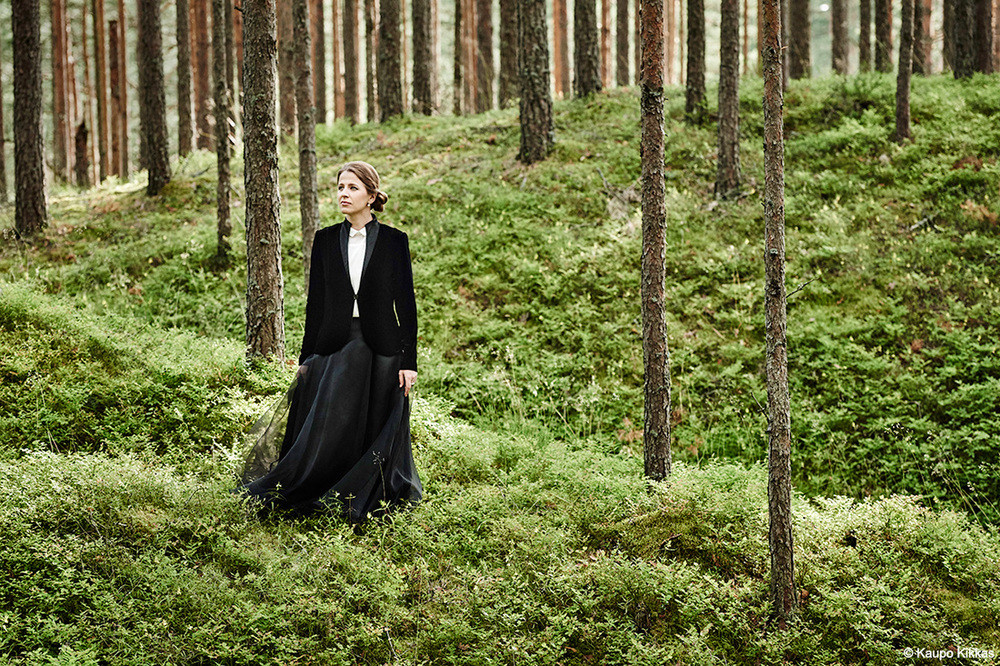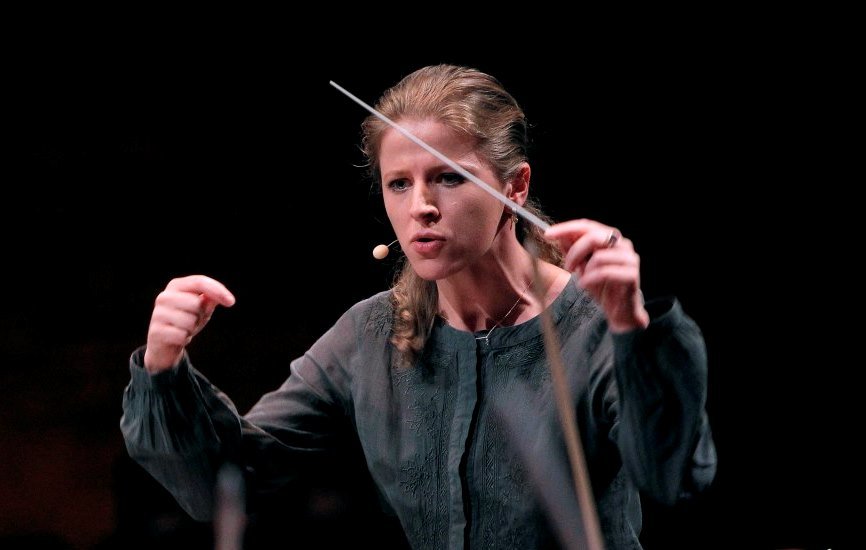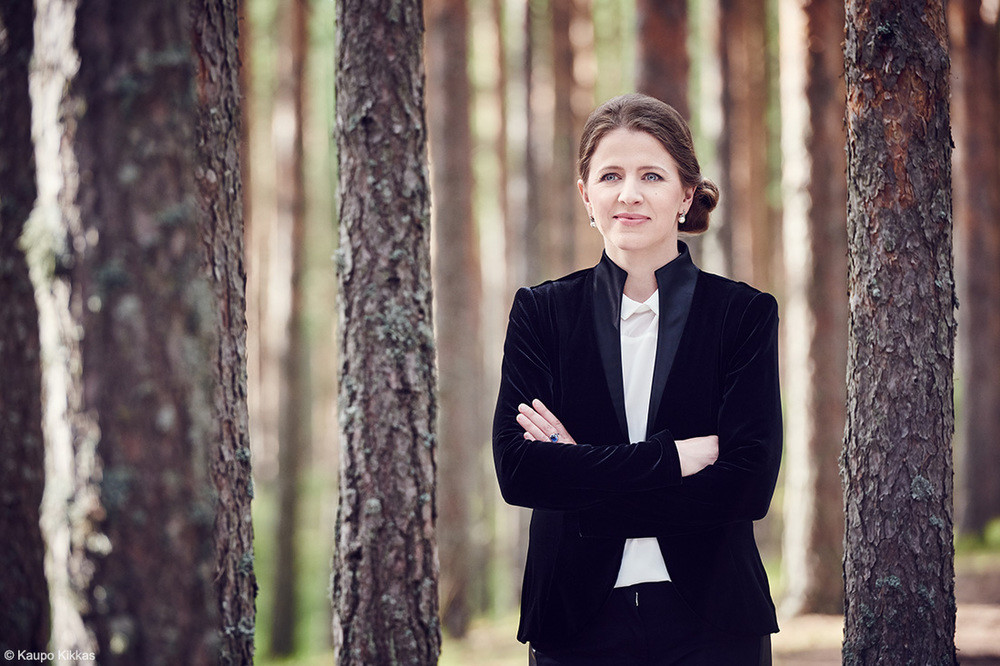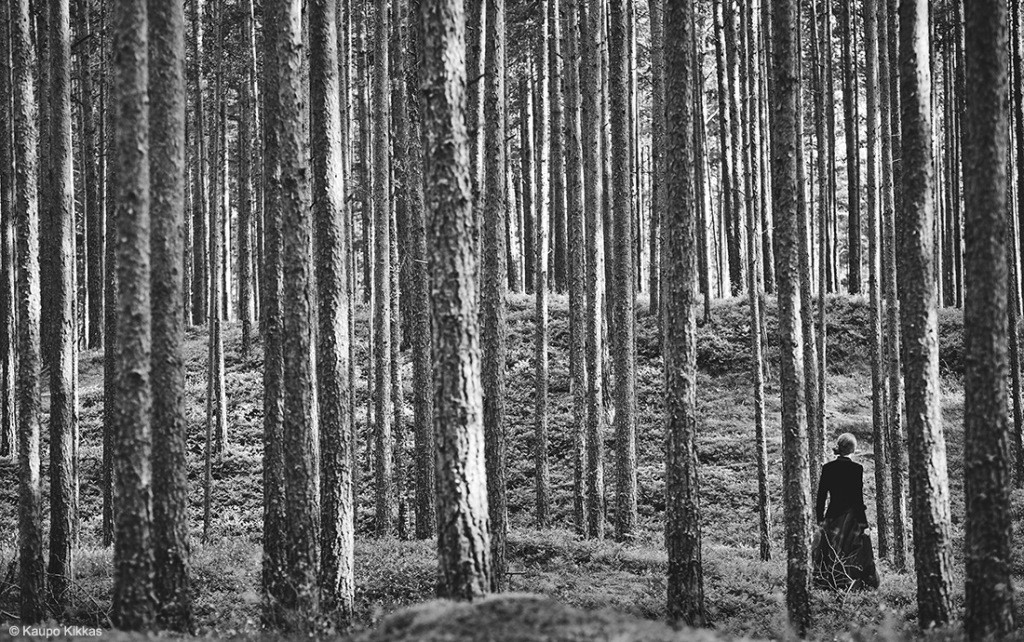Over a decade ago, Kristiina Poska, hailing from the small Estonian town of Türi, went to study in Berlin. Today she has risen to the position of kapellmeister (director of music) of the Komische Oper Berlin – the first woman to do so in the history of the opera house. In 2013, she won the most reputable conducting prize in Germany – also the first woman to ever do so. In 2015, Poska was the busiest female conductor in the world, based on performances in all genres.
The longer interview by Külli-Riin Tigasson was first published in the print version of Life in Estonia magazine.
Poska was born in a small town of Türi, the “spring capital” of Estonia, known for its flower festival. Her musical career began when she was eight years old, when she started to play the piano. After piano studies at the Türi Music School, she studied choral conducting at the Georg Ots Tallinn Music College and the Estonian Academy of Music and Theatre, before moving to Berlin, where she studied at the Berlin University of the Arts and at the Music Academy Hanns Eisler as well as attending classes with conductors Peter Gülke, Reinhard Goebel and Eri Klas.
A decade ago, Poska became a principal conductor of the Cappella Academica, the symphony orchestra of the Humboldt University Berlin, which gave her the opportunity of regular performances at the Konzerthaus Berlin. The 2008/09 season saw her at the Neuköllner Oper Berlin with the highly acclaimed production Ihre Bohème, which soon led to engagements at the Koblenz Theatre, the Brandenburg Theatre and, in 2010/11, to the Komische Oper Berlin for La Traviata. Poska was enthusiastically received there by both the orchestra and the audience and was immediately re-invited for a series of performances of Jacques Offenbach’s La Périchole. She was then appointed as the first kapellmeister of the Komische Oper Berlin.
In 2013, Poska won a reputable conducting award in Germany, the Deutscher Dirigentenpreis. The daily newspaper, Der Tagesspiegel, named her “one of the 25 most interesting people in Berlin in 2013”.
“Kristiina Poska has conquered the fortress which until now has belonged to men” is how the German media put it at the time.
The lush greenery, birdsong and water bodies of the Tiergarten area in Berlin, where Kristiina Poska lives, resemble Estonian nature. She loves to take long walks there and cycles to work through the park in the summer.
Poska’s eyes sparkle and she gesticulates excitedly with her hands when she speaks.
“It is definitely not an advantage to be a female conductor in the cultural landscape of Germany,” she says, and adds, “but it is important to know how to turn disadvantages into advantages.”
Why did you choose to become a conductor?
My grandpa played the piano, but there were no professional musicians in my home; there was no Beethoven playing in the background. My interest in music was abstract. I wanted to play the piano just like grandpa. I went to a music school for children. At one point, I understood that I would not become a pianist because I did not have the patience to spend five to six hours every day playing on my own. My voice was not strong enough to become a singer. But I really wanted to study music and thought I would give choir conducting a try. I must have been about 17 years old when I first saw a rehearsal of the Estonian National Symphony Orchestra and I was so enchanted by the sound that from then on my biggest dream was to conduct an orchestra.
What is the most complicated thing about conducting? Or do challenges change depending on your own development?
I feel things depend on where I am at a particular moment. The challenges are always changing. In the early days, I felt as if I had a guardian angel who only sent me orchestras that wished me well and guarded me from big problems that more experienced conductors often face.
What kind of big problems exist in this field of work?
There may be differences of opinion with the orchestra or there may be vocalists who are difficult to work with because they are in a world of their own and don’t pay attention to the conductor. My tasks have grown in parallel with my own growth as a conductor. I think this applies generally in life, not just in my field of work. We cannot say that a 50-60-year-old person has no more problems or challenges. There are always new ones.
Few years ago you said your challenge was to understand how various orchestras function. What was the most difficult issue for you when you got started?
The main problem back then was me. I was blocking my own way. I had destructive thoughts and a lot of fears.
At first, I was overly humbled by standing in front of people who had worked for years as musicians, who were more experienced than me. It took me a long time to understand there were other factors up there as a conductor that matter more. I also had the feeling that music was so much bigger than me, that whatever I did I was not worthy of it.
But regardless of those fears it attracted you…
I have always had the desire to make music. And at the end of the day, it is this will that counts. There are many difficulties along the way. It is also important that you want to keep at it, no matter what. The music itself is the biggest reward and I am willing to put up with any difficulties along the way for the music.
Is such determination more important than talent?
I believe so. It is necessary to have some talent, because if you don’t have a musical bone in your body, you cannot work in this field. But how far you are able to develop your talent depends on your will and your determination.
And perhaps also on courage and the ability to forgive yourself for your mistakes?
I used to constantly feel that what I did was not good enough. At one point, I decided to start thinking constructively in order to be able to develop as a human being and as a musician.
Artistic people are always full of doubt; it is an important and useful force. But when those doubts take away most of your creative energy, it is the art which suffers. The largest force is the force of your mind. Whereas earlier I had too many insecurities, these days I tend towards the other end of the scale, being too courageous. Some people say one cannot help it when one is shy. But this is not true. Behind the shyness, there is courage.
Disadvantages can be turned into advantages?
Precisely. Each and every one of us has courage; we just need to locate it. I am also convinced that each of us has opposite forces inside us: good and bad, joy and sadness, introvert and extrovert. We are the ones who decide what dominates. I am proof of that.
The conductor of an opera is the only person with his/her back to the audience. Do you think about the audience while conducting?
This may sound strange but the answer is no. I only think about the music when I conduct. It is my job, to conduct the music, to control the evening, to bring the vocalists and the orchestra together. If I fail to give this a hundred per cent of my concentration, something is wrong. There is no time for other thoughts, such as how I look or what the audience is thinking. At the opera, there is a slightly different set-up each evening, for example stand-in musicians from other orchestras who require special attention. The vocalist may be ill and replaced with someone unfamiliar with the production or someone who sings in another language. Such a vocalist may not have had the time to study the production, in which case they sing from the edge of the stage and the director’s assistant plays the role. Or if the vocalist performs, other singers have to be prepared to improvise constantly. In other words, there is always too much excitement at the opera for my thoughts to wander.
So experiences of a conductor would be useful in a textbook on organisational management?
Psychological issues always strongly influence a process. But no matter what the environment or the mood, a conductor needs to stay true to him/herself. It’s great when everything runs smoothly. But this cannot be taken for granted. Even in critical situations, the conductor must remain calm and true to herself, to do the work and to proceed from the music.
You have said in an interview that you have to become the embodiment of an emotion as a conductor.
I have to use my body to show people what I want expressed. I have to radiate those emotions out of my body. Many young conductors make the mistake of emulating someone physically, putting a mask on.
Everything is possible when you change into the thing you want to be. When you are determined enough, you can be who you really want to be. This is the task that we all have as human beings. Many people make excuses and say, “This is who I am, I cannot change.” Everyone can change if they want to! Many characteristics that people consider inherent are not. They are habits or patterns that have nothing to do with someone’s nature.
How much do you pay attention to critics and audience feedback in your work?
There are a couple of opera critics whose opinions I care about. But of course there are as many opinions as there are people. If you aim to please everyone, you end up losing yourself. For an artist, the only real foundation is himself. You need to proceed from your own intuition and feelings.
I have always searched for truth in music, and in most things. But I have come to realise that truth in itself does not exist. For me, truth can only exist in a moment. In music it is not possible to do something convincingly in order to please someone else. The only person I try to please is the composer.
A considerable amount of pop music is made to please somebody.
I would not compare pop music with classical music, as the former mainly has entertainment value. The function of classical music is something else. Art that is made for someone else cannot be totally sincere and this is why I do not believe in it.
You have lived in Berlin for ten years. How quickly did you adjust?
I liked Berlin from day one. There is a certain sense of freedom here. I have always liked big cities and anonymity. However, the connection to Estonia is very important to me and I may one day return to Estonia. Happiness is very much related to what we do. And creative people often go where they have a chance to make the most of their creativity.
What does a normal day look like for you?
It depends on whether I have rehearsals or a performance at the opera, whether I am travelling somewhere as a guest conductor or working from home. At the opera, the rehearsals start at 10 am. On other days, I prepare. I get up around 8, sit at my desk and work with sheet music. Sometimes I sit at the piano, analyse, do background research and read relevant literature. If possible, I go for a little walk around lunchtime.
Arvo Pärt, the Järvi family… even the main conducting prize of Germany has been awarded twice to an Estonian in the last seven years, to Mihkel Kütson in 2006. Why is it music that makes the Estonian culture famous in the world?
Estonian music is definitely something special. Sometimes it seems that it looks even more special from the outside. It is definitely closely linked to our tradition of song celebrations. Just think about how many choir singers we have, how we have sung our way to freedom twice. It is part of our identity. This not only applies to music but to all fields or art and literature. Many of my German acquaintances who like to read have expressed surprise at how many new books and poetry collections are published in the Estonian language. There are a lot for a tiny nation. Estonian people are very creative.
Regardless of the fact that it is not a financially easy choice, many people have dedicated themselves to a risky profession – to art. Perhaps it is our long and dark winters. It is also possible that Estonians who tend to be more inward-looking, look for expression in other fields.
Long winters and an endless longing that are woven into the culture?
Yes, I think it is some Ugric yearning for something that people are not often even able to verbalise. Art, literature and music help us to cope with it.
I
Photos by Kaupo Kikkas and Bjørn Bertheussen, courtesy of Nordic Artists Management. Cover by Bjørn Bertheussen.

